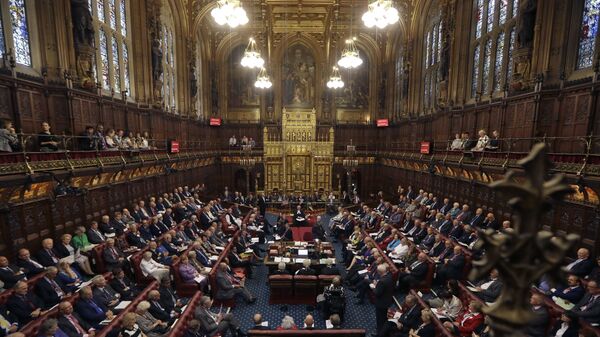The UK House of Lords published fresh concerns on Monday about how European Union laws would operate in Britain after Brexit, as defined by the EU Withdrawal Act of 2018.
Following Brexit, the UK Parliament will convert EU law into domestic law, but will not abide by the EU's "principle of supremacy of EU law", the EU Charter on Fundamental Rights, and "Frankovich" clauses which holds member-states accountable for failing to implement EU law.
READ MORE: Terms of Our Exit Are Now Clear — May Delivers Brexit Update in Parliament
However, Lords advised Parliament to implement protocols to convert EU laws to UK ones "initially as close as possible to that which currently exists," Parliament admitted in a July 2018 report, and demanded the UK government to determine how it would amend direct "principal and minor EU legislation". The UK government also specified it would follow World Trade Organization rules, but failed to clarify how it would procure legislators to participate in the WTO Government Procurement Agreement, which sets the framework for cooperation between the EU and 18 WTO member states. Parliamentarians also rushed to write the 2018 Trade Bill, but placed a section on making criminal offenses, charging fees, and creating new public bodies in explanatory footnotes for clause 2 instead of the bill's text, prompting Lords to recommend adding an amendment to include the scope of these powers. Clause 9 in the Trade Bill creates a Trade Remedies Authority (TRA) to take over anti-dumping regulations normally done by the EU, aimed at protecting UK markets from foreign monopolies and subsidies. However, Lords noted that legislators rushed to fill new positions without clearly defining the TRA's powers and scope.
READ MORE: Ex-British Foreign Secretary Says EU Treating UK With 'Naked Contempt' in Brexit
"While we recognise the pressing timescales and uncertainties concerning Brexit, in constitutional terms, creating and empowering an important public body in such a manner is inappropriate," the report said. Lords also lamented that there was no framework for working with devolved powers such as Scotland and Wales, whom the UK government must ask for legislative consent before approving provisions in the Trade Bill, in addition to cooperating with Europe's Joint Ministerial Committee on international relations and treaty-making after Brexit.
Lords urged both devolved governments and Westminster to "engage in constructive dialogue to achieve legislative consent on the Trade Bill". They also concurred with the Exiting the European Union Committee (EEUC), who slammed the government for making inadequate processes to scrutinize proposed EU treaties under section 20 of the Constitution Reform and Governance Act of 2010, mentioning that "Post-Brexit the UK Parliament will need to consider new mechanisms for scrutinising proposed treaties".
The EEUC will convene on Wednesday morning to discuss the progress of the UK's withdrawal from the EU, following UK prime minister Theresa May's House of Commons address on Monday, who called for "cool, calm heads" during the final stages of negotiations and argued for a "backstop" that would act as an "insurance policy for the people of Ireland and Northern Ireland."




